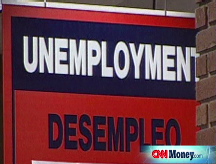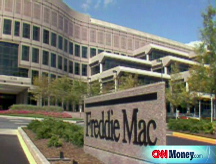Stocks rally on housing rescue
Dow surges 290 points as investors consider what the Fannie and Freddie bailout means for the broader economy.

NEW YORK (CNNMoney.com) -- Stocks surged Monday, with the Dow gaining 290 points and the broader market also gaining as investors breathed a sigh of relief that the government has swooped in to bail out Fannie Mae and Freddie Mac.
The Dow Jones industrial average (INDU) added 290 points or 2.6%. The broader Standard & Poor's 500 (SPX) index added 1.8%, paring its morning gains. The Nasdaq composite (COMP) added 0.6%, after climbing in the morning and then falling in the afternoon.
Stocks surged in the morning, with the Dow up 350 points, as investors welcomed the bailout news. But questions about what the bailout will really mean for the housing market knocked the wind out of the rally in the afternoon.
However, investors redoubled their efforts in the last hour of trade, pushing stocks higher through the close.
"This is positive news, but it's not the panacea for the whole real estate crisis," said Steven Goldman, market strategist at Weeden & Co.
Goldman said the general feeling was that the government is providing an environment in which mortgage rates or spreads can decline, as borrowing costs drop. This environment should be helpful for people who want to refinance or get into the mortgage market.
While all of this is reassuring to investors, it doesn't wipe out the broader concerns about the economy, he said. Meanwhile, there was still worrisome corporate news in play. Worries about Lehman Brothers' well being and the threat of a United bankruptcy dragged on those stocks. Weakness in Oracle, Google and other large techs put a limit on the Nasdaq's gains.
Jon Burnham, portfolio manager at Burnham Securities, said that while the federal move was necessary, it doesn't mean the housing and credit crises are over.
"This was something the government clearly had to do and it should stabilize the housing market over the next six to nine months by lowering mortgage rates," he said. "But I don't see that this changes the overall environment that dramatically."
(Why the bailout is not a quick fix for the economy.)
Burnham said that the runup on the Dow probably reflected short covering and program trading. Short covering refers to the process by which investors who have sold stocks short to take advantage of a falling market have to buy them back because they think the tide could be turning.
One longer-term positive of the takeover news is that it should help reassure investors who have been loathe to put money to work in the stock market, said Jim Dunigan, chief investment officer at PNC Advisors.
"One of the challenges we've been facing is that there was no appetite for risk," Dunigan said. "With equity fund outflows, we were seeing that many in this bear market had fled to the sidelines. This will improve the appetite for risk."
After the close of trade, it was revealed that Dell (DELL, Fortune 500) founder Michael Dell bought $100 million of Dell shares last week, sending the stock 1% higher in extended-hours trading.
Fannie and Freddie: The Bush administration said Sunday that it was taking control of the mortgage backers in an attempt to help stabilize the battered housing market and bring down mortgage rates.
Treasury Secretary Henry Paulson said the companies were being put under a government conservatorship and both chief executives were being replaced. The Treasury Department will put up to $100 billion in each company over time to keep them afloat, in exchange for senior preferred stock.
Both the common and preferred shares of the companies plummeted.
The two government-sponsored firms own or back about half the mortgage debt in the country and have lost billions in the housing market collapse. The plan should lower mortgage rates by lowering Fannie and Freddie's borrowing costs.
But analysts are split as to how much the plan will be able to help the battered housing market and sluggish economy. (Full story)
While the announcement has a psychological impact, it is not the ultimate solution to what ails the housing and credit markets, said William Rutherford, president at Rutherford Investment Management.
"If banks are going to continue to be tight in their lending policies and if we don't get a stabilization in housing prices, I don't think we can turn the economy and the housing market around," he said.
Additionally, he said, investors are still contending with cash-strapped local and regional banks, not to mention the global economic slowdown.
Financial shares: A variety of financial shares rallied on the Fannie and Freddie news, including Dow components Bank of America (BAC, Fortune 500), Citigroup (C, Fortune 500) and JP Morgan Chase (JPM, Fortune 500).
But some financial stocks tumbled, including Lehman Brothers (LEH, Fortune 500), which plunged 12.7% on ongoing worries about its financial health. Meanwhile, shares of Washington Mutual (WM, Fortune 500) were volatile following news that its CEO has been ousted.
What's significant is that all the banks and brokerages don't seem to be moving in unison any longer, said Weeden's Goldman.
He said that some are mired in toxic waste and won't be able to survive, but others have a mix of the good and the bad. "I think we're at a point (with the sector) where the haves are starting to recover and the have nots are languishing," said Goldman.
Fuel prices: Oil prices churned, ending a bit higher as Hurricane Ike headed toward the Gulf of Mexico and other tropical storms continued to pose threats. Additionally, investors were keeping an eye on the OPEC meeting in Vienna this week, amid bets that the cartel could cut production levels due to the recent slide in prices.
Prices have fallen more than $40 a barrel from a record high of $147.20 in July, on bets that a sluggish global economy is cutting into demand.
U.S. light crude oil for October delivery settled up 11 cents a barrel at $106.34 a barrel on the New York Mercantile Exchange, after ending the previous session at a five-month low.
Gas prices declined for an eighth straight day, according to a national survey of credit-card activity.
Company news: Altria Group (MO, Fortune 500) said it would buy UST (UST), the maker of tobacco dip products such as Copenhagen and Skoal, for about $10 billion, confirming speculation.
UAL denied talk that a bankruptcy filing was imminent for its United Airlines, blaming speculation on an erroneously republished news article from 2002. Shares of the air carrier's parent company had been halted by the Nasdaq after the stock plunged 27% on the talk. UAL (UAUA, Fortune 500) shares slumped 11% once trading resumed. (Full story).
Nvidia (NVDA) shares slipped 4% after UBS downgraded the graphic chipmaker to "sell" from "neutral," Briefing.com reported.
RF Micro Devices (RFMD) fell 10.6% after Citigroup downgraded the chipmaker to "hold" from "buy" after Nokia (NOK), its largest customer, warned it would experience a market share loss in the third quarter.
Other tech losers included Oracle (ORCL, Fortune 500), Google (GOOG, Fortune 500) and Apple (AAPL, Fortune 500).
Market breadth was positive. On the New York Stock Exchange, winners beat losers five to three on volume of 1.64 billion shares. On the Nasdaq, advancers beat decliners by almost three to two on volume of 2.61 billion shares.
Other markets: In global trade, European and Asian markets rallied.
In the bond market, Treasury prices rallied, lowering the yield on the benchmark 10-year note to 3.67% from 3.72% late Friday. Prices and yields move in opposite directions.
The dollar gained versus the euro and fell versus the yen.
COMEX gold for December delivery fell 30 cents to $802.50 an ounce, erasing morning gains. ![]()





